Dear readers,
In this newsletter, we would like to give you an overview of our current course and consulting offers and inform you about recent developments in the field of research data and research software management.
In the first article ‘What is zedif’ we introduce ourselves and draw your attention to our practical course programme for the summer semester 2025. By participating in various courses, you can now earn our ‘Digital Research’ certificate. With the zedif Fellowship Programme we offer you, in addition to our general consulting services, direct support in digital research issues from a personal mentor for one year.
There is also news from the DFG, which published ‘Guidelines for the Development of Research Software’ in October last year.
The University of Jena expanded its digital tool portfolio, which now includes the electronic lab notebook eLabFTW, the research data repository REFODAT, a discounted Overleaf licence, as well as the option to use ChatGPT4-Turbo securely via the HAWKI AI ChatBot and the translation service DeepL. With your university account you can also use the services of the European Open Science Cloud — EU Node.
Have you already published a research dataset? Then submit your dataset for the FAIRest Dataset Award 2025 by 15 April! Learn more about research data management at the Coffee Lectures or the Thuringian RDM Days 2025, both organised by the Thuringian Competence Network for Research Data Management.
We would also like to draw your attention to the 2nd OpenIRIS User Day for the JenaVersum and look back on the successful datathon “Datenwerkstatt Jena 2025”.
Zedif works closely with various stakeholders in the higher education sector. Do you know the projects ‘Gender in Focus’ and ’THInKI’? We look forward to your participation!
Last but not least, please take part in our quick question and let us know which workshop topics would be of interest to you!
Have fun reading, exploring, and finding out more!
Your zedif team
Information
zedif — What we do
zedif is short for “Competence Center Digital Research“. We provide open doors and helping hands for all digital concerns of researchers.
We are the central point of contact for researchers from the University of Jena, who are looking for help with digital issues they may face during their research.
We provide assistance on a wide variety of topics like teaching and training, grant applications, or selection or development of digital research tools and workflows. We are looking forward to every request, be it small and quickly answerable on the phone, or year-long cooperations. If you are unsure on who to contact, we will help you find the correct contact person and provide additional consultations where needed.
Get in contact:
- Servicedesk: https://serviceportal.uni-jena.de/zedif
- Matrix Chat: https://matrix.uni-jena.de/#/room/#zedif-consultation:uni-jena.de
- E-Mail: zedif@uni-jena.de
- Telephone: +49 3641 9-46435 or 9-46340
You can find us at the 21st floor of the JenTower. Please make an appointment beforehand so the best suited consultant will be available for you.
[up]Announcement
Practical courses for the summer semester 2025
In the summer semester 2025, zedif once again offers numerous courses that teach basic knowledge and skills in digital tools, research data management, and programming. In addition to the basic courses, we again offer our introductory workshop on machine learning aswell as advanced courses on programming and high-performance computing. A new addition is our workshop on the electronic lab notebook eLabFTW.
All courses can be be credited towards our new certificate “Digital Research”. For details see the following section. You can also earn a Carpentries certificate by completing our Software Carpentry workshop series.
This semester we are offering the following courses:
Research Data Management
- Research Data Management Plans — more than a formality!
- Research Data Management – Make your data count!
- Introduction to Experiment Documentation with eLabFTW
Data processing and analysis
- Introduction to the Command Line
- Advanced Use of the Command Line Bash
- Basic Version Control with Git: A Beginner’s Workshop
- Version Control and Project Management with GitLab
- Introduction to Programming with Python
- Scientific computing with Python and NumPy
- First Hands-on Experience with an HPC Cluster
- Introduction to Parallel Computing
- Basics of Machine Learning for Non-Computer Scientitst
Carpentries Certificate Courses
The Carpentries are an internationally active non-profit organisation. Their aim is to make basic data and software skills accessible to increase efficiency, openness and reproducibility in science and research. The Carpentries consist of three flavours with different focuses: Data Carpentry, Library Carpentry and Software Carpentry. We offer the following course in the summer semester:
- Software Carpentry Workshop (Unix Shell, Git, Python)
By participating, you can acquire an internationally recognised Carpentries certificate.
All details about the courses and registration can be found in our catalogue within the Qualification Portal. The courses are open for all members and students of scientific institutes in Jena. The course language is generally English.
If you have any ideas or wishes for further courses, feel free to contact us.
[up]Information
Certificate for Competencies in Digital Research
Show your digital research skills to your future employer using the certificate “Digital Research”.
Digital tools changed the world, and with that also research. Consequently, especially PhD students and postdocs are nowadays expected to aquire digital research skills. However, a lot of study courses do not include those important topics.
You can now aquire the certificate “Digital Research” by participating in workshops at zedif and others. Those courses have to be spread across the three pillars “research data management”, “data processing and analysis“, as well as “publication and presentation”, with the possibility to set a personal focus. You can find all important information on the zedif certificate on our website.
[up]Information
Become a zedif fellow
The zedif fellowship: one year of direct support for your digital research by a personal mentor.
Your research will be supported for one year by regular meetings with a personal mentor at zedif. During that time you get to know new tools and digital research methods, and extend your professional network both within and beyond the universtity. After one year, your research will be more oriented towards modern and future-proof methods.
We do target especially PhD students and postdocs, but this program is generally open to researchers of all career stages. However, since the number of fellowships severely limited, we do require a short application. The necessary documents only include a short CV and an one-page description of both your research project as well as the digital challanges you would like to address within that year.
The following criteria will play a role for the evaluation:
- the quality of the proposal
- the diversity of research topics among applicants
- the use of open licenses for data and/or software
- the fit with existing expertise at zedif
To cover especially the last point, we strongly recommend to contact us before an application. The next application deadline is 30 May 2025.
For more details on the zedif fellowship visit our website.
[up]Information
Guiding principles of the DFG in the development of research software
In October 2024, the German Research Foundation (DFG) published Guiding Principles for the Development of Research Software. Research software plays an important role in digital research practice, as it enables research and data utilisation and contributes significantly to the reproducibility of scientific results. The DFG principles provide researchers with guidelines for the (further) development of research software. These include adherence to existing standards for development processes (e.g. guidelines from GI and de-RSE), orientation towards quality criteria (e.g. FAIR4RS principles), ensuring accessibility and documentation as well as citation and reusability. In addition, special attention is paid to the sustainability of software by providing research software in suitable infrastructures and developing a structure for the active participation of the user and development community.
[up]Information
New digital services and tools at the University of Jena
The digital service portfolio of the University of Jena has been expanded considerably in recent months. We would therefore like to give you a brief introduction to the new services:
eLabFTW — Electronic Lab Notebook
Since January 2025, the University Computer Center (Universitätsrechenzentrum, URZ) offers all researchers at the University of Jena access to eLabFTW, an electronic laboratory notebook (ELN) to plan, implement, and document their scientific experiments. In addition, eLabFTW can be used to manage resources for experiments, such as chemicals, instruments, samples and equipment. eLabFTW allows collaborative work in teams.
Information about the service can be found in the service description (in German). The URZ and the IT Centre of the Thuringian Universities (IT-Zentrum der Thüringer Hochschulen, HS-ITZ) are currently working on making eLabFTW available to researchers at all Thuringian universities. This endeavour is supported by the Thuringian Competence Network for Research Data Management (TKFDM) and by the zedif.
The zedif is happy to support working groups in the transition to digital documentation of experiments with eLabFTW. Feel free to get in touch with us.
REFODAT — Research Data Repository
Since November 1, 2024, researchers at Thuringian universities have access to a new service for the publication and long-term storage of their research data. The Repository for Research Data Thuringia (REFODAT for short) is a generic publication platform for datasets from all subject areas, especially for those for which no suitable subject-specific repository is available. The publication of research data is free of charge for all researchers at Thuringian universities. A REFODAT workshop is taking place at 29 April 2025 at 2 pm and will be held in English language.
Overleaf
More and more researchers use LaTeX to publish their work. Overleaf is a very popular web-based editor for LaTeX. However, this web service requires a licence fee.
The university decided, partly due to the high return of our „quick question“ in the last newsletter, to offer researchers licenses directly and for a much reduced price of 5 €/month (instead of 19 €/months) from now on. You can order yours through the servicedesk. However, please first collect requests if possible and send those in bulk.
HAWKI — AI ChatBot
Since the beginning of this year, the IT Center of the Thuringian Universities has been providing the web-based platform HAWKI for the secure and effective use of an AI chatbot, which can be used by all employees of the University of Jena with a valid URZ account. The HAWKI platform currently enables the use of ChatGPT with the GPT4-Turbo version of the company OpenAI and a usage quota of tokens, which is calculated and deducted for each search query. General information on the use of generative AI tools at the University of Jena can be found here.
DeepL — Online Translator
The IT Center of the Thuringian Universities (HS-ITZ) provides the online translator DeepL to all employees of the University of Jena with a valid URZ account. The service is designed to translate texts between different languages using the DeepL API. At DeepL, up to 20,000 characters or 10 documents can be translated per person per month.
The advantage of the DeepL and ChatGPT portals provided by HS-ITZ is improved data protection, as no login data is forwarded such that individual queries are not linked to any particular user.
[up]Ankündigung
EOSC EU Node for members of the University of Jena
The European Open Science Cloud (EOSC) has created a platform to support multi-disciplinary and multi-national research promoting the use of FAIR (Findable, Accessible, Interoperable, Reusable) data and supplementing services.
The EOSC EU Node provides tools and support for individuals and institutions to plan, execute, disseminate, and assess research workflows, and is managing services, hosted and operated by third-party contractors. EOSC also helps other potential node candidates, like the NFDI, by facilitating an interoperability framework for easy establishment.
If you are a researcher with an interest in data-driven open science, you can use the EOSC EU Node to find and access interoperable and reusable data, publications, software and other services (e.g. synchronizing, sharing and transfering large files, interactive notebooks, virtual machines, cloud container platforms), enabling you to also implement and execute research workflows. The services are provided within an infrastructure that strictly adheres to the EU GDPR.
As a member of the University of Jena you will be granted 500 Credits every 90 days to explore and use the services provided by the EOSC EU Node. Follow this link to try it out!
[up]Announcement
TKFDM announces 6th FAIRest Dataset Award
WANTED: FAIRest Dataset in Thuringia 2025. Did you ever publish a dataset that followed the FAIR-Data-Principles? Then take part in the FAIRest Dataset competition!
The Thuringian Competence Network for Research Data Management (TKFDM) awards the dataset that best implements the FAIR Principles with a prize money of up to 2,000 €.
Submit your published datasets until 15 April 2025! Eligible are all researchers who are working at a Thuringian university at time of participation.
Further information on the competition and the conditions of participation can be found on the TKFDM website.
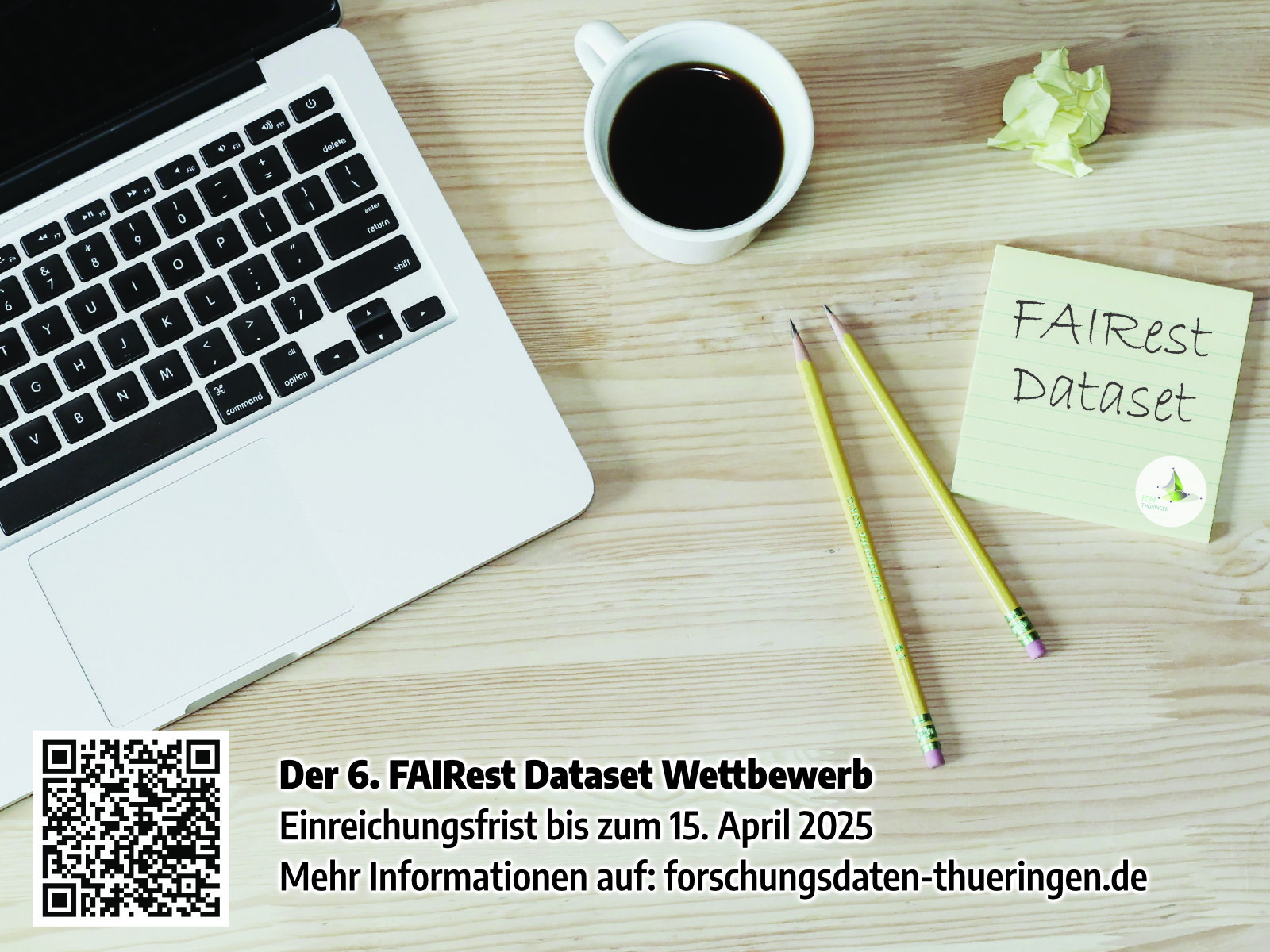
Announcement
Research Data Management Coffee Lectures
The Thuringian Competence Network for Research Data Management (TKFDM) continues its successful Online Coffee Lecture series in the summer semester 2025.
This semester’s event series is dedicated to the 5 most popular (TK)FDM contributions from the past years, but this time in English language! Thematically, there is something for everyone, from data management plans to data organization, publication and documentation as well as the RDM requirements of publishers and research funders! The Coffee Lectures take place every last Wednesday of the month (except August!) at 2 pm online via Zoom. Participation is free of charge. Make yourself a cup of coffee or tea and join the event! Registration and further information can be found on the Coffee Lectures Homepage of the TKFDM.
The TKFDM offers permanent access to all Coffee Lecture materials of the past years. Recordings of all events are available on the TKFDM YouTube channel, while the presentation slides can be found on zenodo.
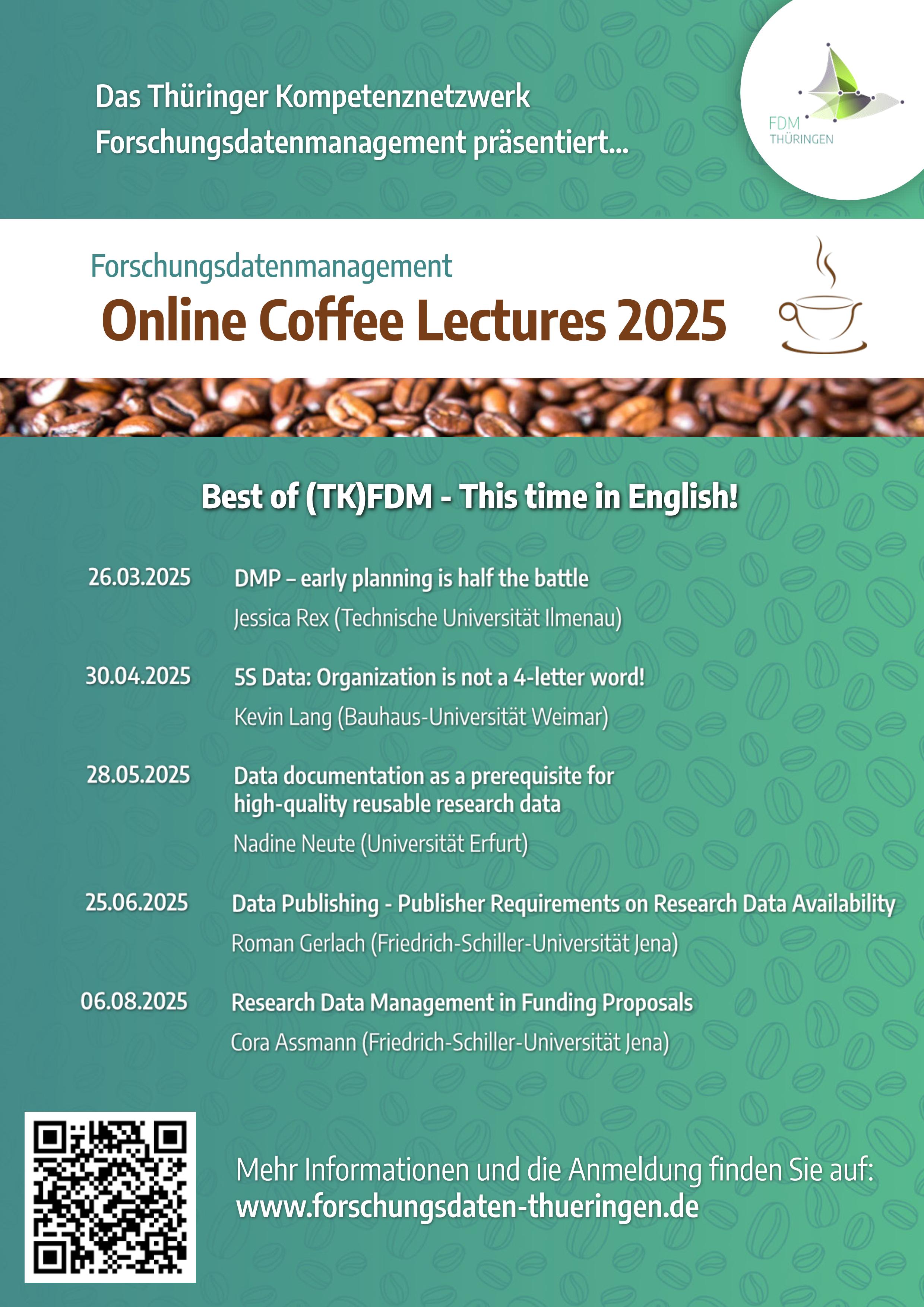
Announcement
Save the Date! Thuringian Research Data Management Days from June 18th to 19th!
On June 18 and 19, 2025, the Thuringian Competence Network for Research Data Management (TKFDM) invites you to the seventh edition of the Thuringian RDM Days. The free online conference is aimed at all researchers in Thuringia.
Under this year’s motto “Empowering Research — Tools and Practical Examples from Thuringia”, the conference will be held in English language for the first time. The first day of the event will be dedicated to current Thuringian activities in research data management (RDM) and will once again offer an introductory RDM workshop. The second day will focus on practical tools for everyday research. Among others, the following will be presented:
- elabFTW — an electronic laboratory notebook for the structured documentation of research results
- OMERO — a platform for managing and annotating image data
- Overleaf — a cloud-based, collaborative LaTeX editor
Registration and the detailed program will be available soon here.
Don’t want to miss any future RDM events? Then subscribe to the TKFDM mailing list.
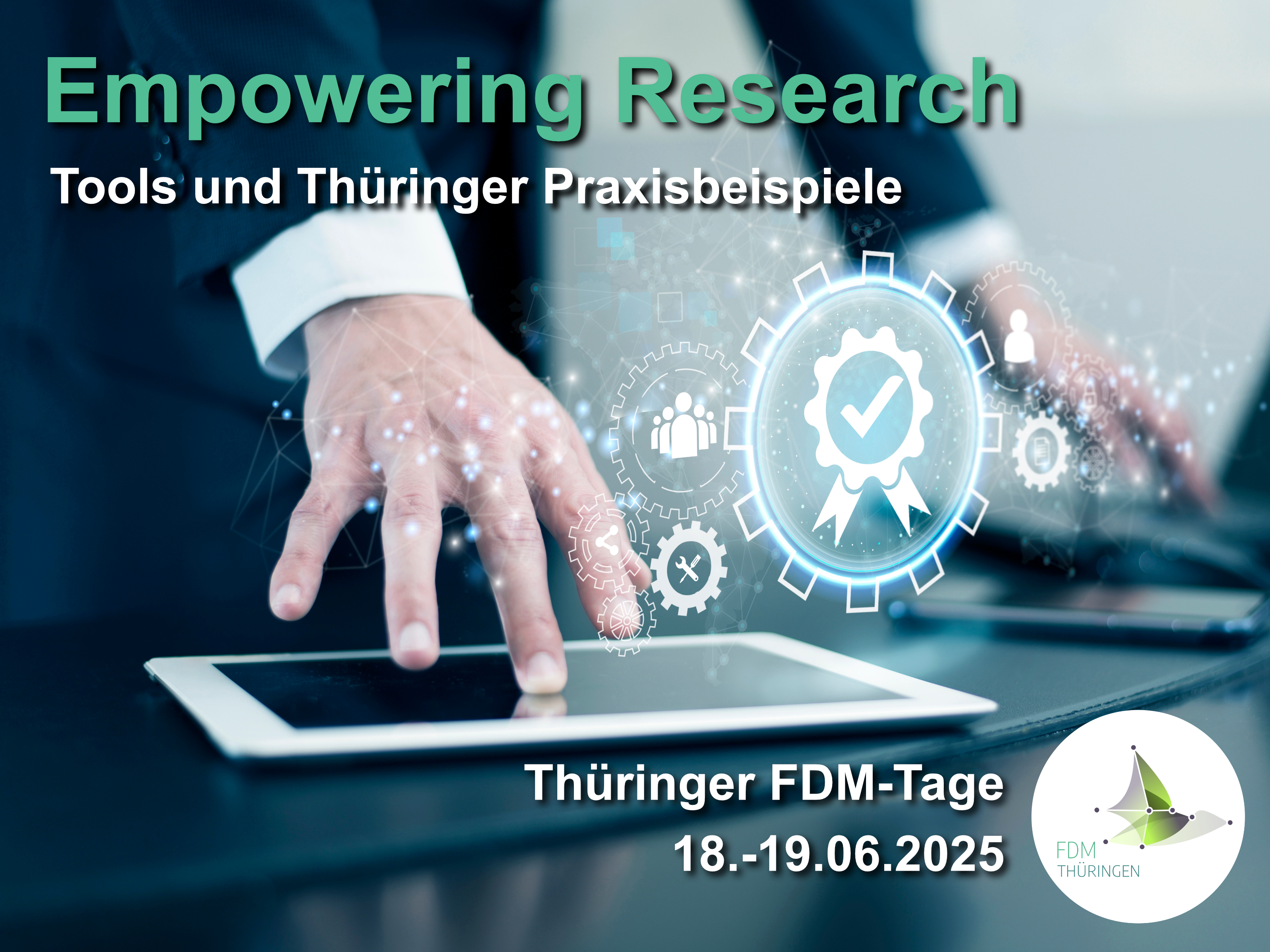
Ankündigung
Second OpenIRIS User Day on 6 May 2025
The science hotspot Jena is characterised by excellent research and a high density of large-scale equipment infrastructure. The project ”JenaVersum 2023–2026” is further developing a cross-location, resource-efficient use, in particular by implementing the open source platform OpenIRIS. Following the completion of the successful pilot phase in summer 2024, additional organisations, institutes and core units have started to use the platform, thus supporting the creation of transparency and driving innovation in the research landscape. The 2. User Day on 6 May 2025 from 14:00 to 16:00 in the auditorium “Zur Rosen” is not only intended to create an information and exchange opportunity for current users and interested parties, but also to support the strengthening of cooperation within JenaVersum. We look forward to numerous registrations and a varied exchange.
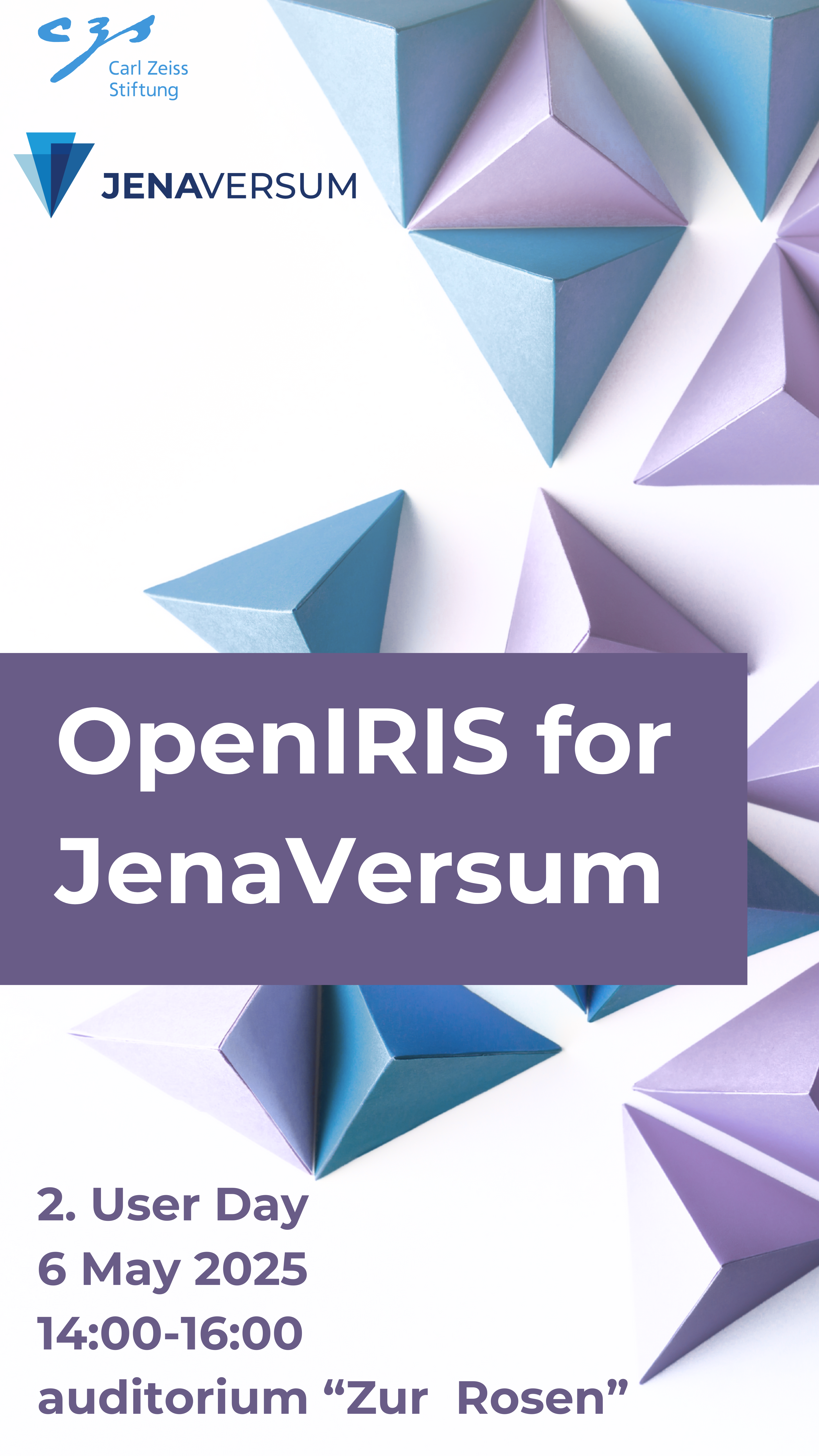
Retrospective
DaLiJe Datathon “Datenwerkstatt Jena 2025”
From March 26 to 28, the second edition of the Data Literacy Datathon took place at the University of Jena under the title “Datenwerkstatt Jena 2025.” The event was organized by the Data Literacy Jena (DaLiJe) project in cooperation with the Competence Center for Digital Research (zedif) and partners from Jena.
Participating students worked in three interdisciplinary teams on data-driven projects focused on improving the digitalization of administrative processes, developing workflows for the 3D digitization of cultural assets, and exploring how to assess and effectively monitor the state of the university community in the future. They received support from mentors who provided guidance on methodological and technical questions.
The organizers were very pleased with the outcomes and the positive feedback from both the challenge providers and the participants. The Data Literacy Datathon is planned to take place again next year. Further details about the event and its challenges can be found on the event website.
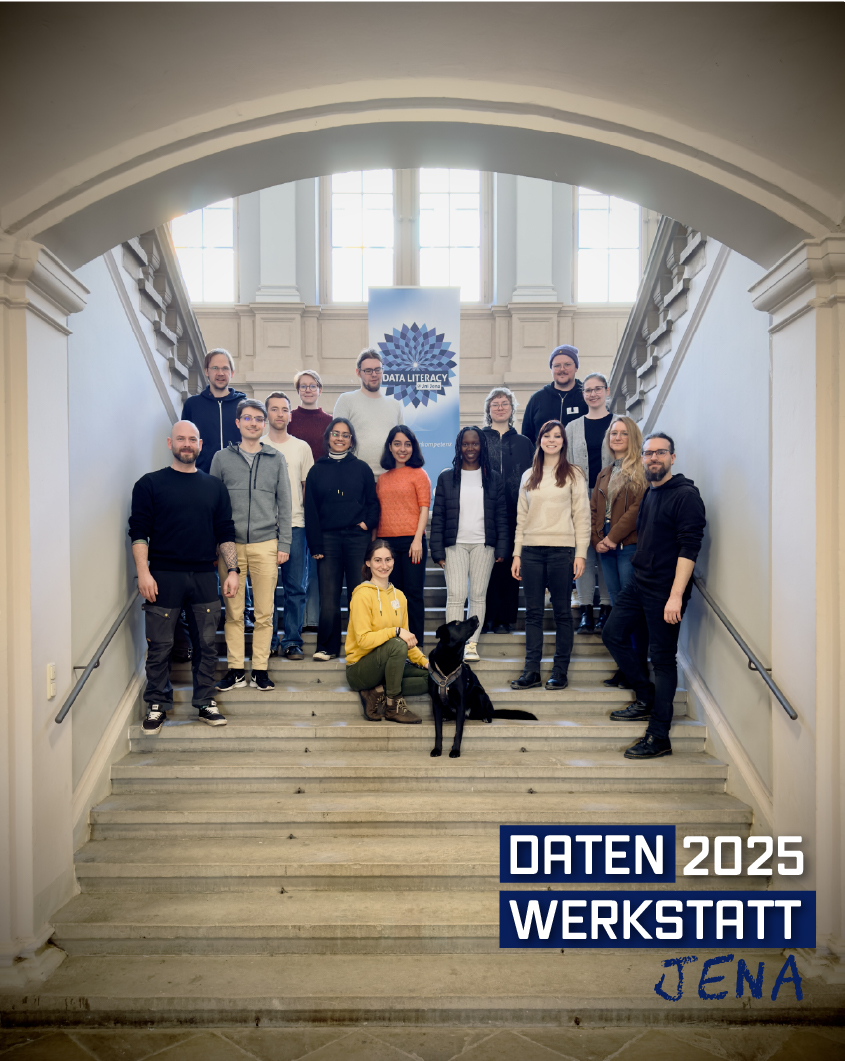
Announcement
Presenting workshops and funding opportunities from the project “Gender in Focus”
“Gender in Focus” is a newly funded project by the Federal Ministry of Education and Research (BMBF) to establish sustainable structures for the systematic consideration of sex and gender aspects in research at the University of Jena.
To enable scientists to recognize and account for aspects of socio-cultural gender and biological sex in their research, various workshops and trainings will be provided. These will convey theoretical knowledge as well as practical methods to incorporate these aspects into scientific endeavours (find the programme here).
The following funding opportunities for researches at the University of Jena exist:
- The Förderpreis „Geschlechteraspekte im Blick 2025“ (German text only) honors exceptional projects which already accommodated gender aspects. The application period ends April 30th, 2025.
- The Förderfonds „Gender in Focus” (German text only) supports scientists to integrate gender aspects into research projects. The application period ends May 31st, 2025.
The zedif is part of the project’s steering committee, and will raise awareness and increase consideration of gender aspects in consultating, teaching, and training.
[up]Announcement
THInKI — the AI-certificate programme is starting
As part of the national initiative to establish AI in higher education, the THInKI project (Thüringer Hochschulinitiative für KI im Studium, German only) is developing a certificate programme focusing on artificial intelligence at the University of Jena since 2022 which can now be attended by graduate students. (Most of the courses are taught in English.)
More information can be found on the website of the virtual campus of Thuringia (German only).
The certificate programme is being developed in cooperation with the Technical University of Illmenau. Regardles of the scientific domain, students are encouraged to attain the certificate through extracurricular subjects, special courses within the curriculum, or ASQ-modules. Additionally, THInKI approved teaching and training events will continuously be added to round off the certificate. Teaching events and courses, with theoretical or practical AI-content can be submitted to the project’s coordinator (see below) anytime.
Please advertise the AI certificate programme in your courses.
Contact and coordination: Dr. Oliver Mothes
[up]Information
Our quick question
Which workshop topics would be / are beneficial for your research or your research group?
[up]